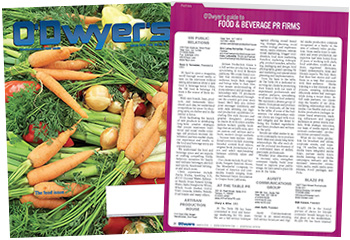 Melissa Musiker |
Restaurants have recently been drawn into the #MeToo movement’s storm, with a regular cadence of public revelations regarding celebrity chefs and their unsavory back-of-the-house and after-hours behavior. Unless you were connected to the restaurant world, these revelations likely came as a surprise. It’s a challenge to reconcile the dissonance between the progressive public personas of the chefs and restaurateurs who promote their fresh, local, organic, sustainable and ethical foods against their offensive — if not illegal — behavior towards employees (frequently women, people of color, LGBTQ and other vulnerable individuals) entrusted with preparing these carefully curated and cared-for foods. The workplace challenges in the sector extend beyond harassment or abuse. Tipped wage has a long, sordid history, and often workplace protections and leave policies don’t apply to many restaurant workers. Cultural appropriation of food traditions is another equally challenging question to grapple with.
|
|
As a talented, albeit amateur eater, I’ve been comparing the current environment with my own professional work focused on reputation, issues and influencers in the food space. There’s no consensus amongst industry thought leaders regarding the responsibility of food journalists, restaurant critics, rating groups like Michelin and Zagat and rankings like The Worlds 50 Best to consider workplace culture or Corporate Social Responsibility alongside décor, hospitality, service and food. As this group actively debates these questions in traditional and social media, I’ve been surprised how little has been said about the responsibility of diners to demand professional and respectful work environments for those working and making careers in the sector.
This new-found public awareness presents a dilemma to the woke diner: How is one to know which chefs and restaurateurs are the “good guys” and which are the “bad guys”? And once I know who the “good guys” and “bad guys” are, how do I use that information to make choices? What can I do as an eater to be an agent for change?
Change comes when all parties involved demand it. Over the past ten years, there’s been a wave of influencers and policymakers publicly challenging the status quo of the U.S. food system. As a result, expectations of transparency and the trend of making values-driven food and dining choices have made sustainable nutrition a lifestyle for many consumers. By giving their business to companies that align to their values and choosing products that enable them to demonstrate their support of this lifestyle, the food system has shifted in a meaningful way. There’s no reason this same feedback loop of business and societal pressure won’t create similar change again.
Transparency and external awareness is the catalyst. We remove stigma by moving this conversation to the public space. Demand for information is at an all-time high and while this risks devolution into a witch hunt, those in a position to be impartial brokers of information, notably journalists, need to consider and investigate both professional leadership and unprofessional behavior as part of the story when writing about restaurants, restaurateurs and chefs. Eater Editor Amanda Kludt announced in February that it would no longer review or promote restaurants affiliated with known abusers. Admittedly, this is a gray area and presents a host of journalistic dilemmas, but it’s likely that others will follow.
ESG factors are a standard part of corporate evaluation and can be applied to restaurants. Those evaluating, awarding or ranking restaurants can also consider the professional behavior of leadership, policy decisions and business practices alongside food quality and diner experience. Examples of awards and rankings considering these factors abound. This should start as a reward for those who are doing it best or breaking new ground. As with many changes in corporate practice, what begins as CSR amongst the most progressive and sophisticated in the industry, over time evolves into industry standard. Danny Meyer of Union Square Hospitality group has been recognized as a leader in this area by eliminating tipping and offering paid parental leave to full time employees. Others can and should receive similar positive recognition. The James Beard Foundation has already asked its voters to focus on professionals who should be held up as “role models” and not nominate those where a voter might have concerns about behavior or culture.
More must be done to promote and support female chefs. Chef Amanda Cohen of Dirty Candy said it succinctly in a recent essay for Esquire: “I’ve worked in food for 20 years. Now you finally care about female chefs?” The problem of disproportional under-representation of women and minorities as experts on a topic isn’t unique to food but it is one that can be rectified with more commitment and awareness. Female entrepreneurs also note that they don’t have the same access to investor capital or quality employees. Increased validation and coverage by media can help level the playing field and address common stereotypes surrounding female leadership.
Readers and eaters need to vote with their time and dollars. Impressions, click-throughs and retweets matter to media outlets, journalists and advertisers. Read, comment and share articles that give women equal play. Eat at restaurants owned or helmed by women. Treat restaurant staff with respect. More female restaurant workers have experienced sexual harassment by customers than co-workers or managers. If you have concerns about the negative impact of tipped wage, eat at restaurants that have eliminated the practice and are known to be struggling to convince the public of the value of the change.
In the era of social and digital media, this often-uncomfortable increase in awareness doesn’t come as a slow, steady trickle but as a torrent of bad publicity. When this happens, it isn’t just that business slows for the owners and chefs; there’s also a decline in tips and job security for staff, many of whom have already been victimized. Remediation, addressing toxic culture and changes in leadership are critical internal steps to be externally communicated. Once these steps have been taken, diners and reviewers need to return, or we risk creating scenarios where there are no benefits to those who come forward or make difficult changes.
There’s no straightforward pathway to shift cultural norms. A new generation of restaurant industry leaders and eaters, much like their peers in other sectors, come to this topic with a lower level of tolerance for bad behavior and higher expectations for workplace professionalism and egalitarianism. This is a good thing. My prediction is that in five years, we’ll be having a very different conversation.
***
Melissa Musiker, MPP, RD, is senior director of APCO Worldwide based in New York City. She leads the agency’s influencer engagement practice and is also creator of APCO’s propriety Telescope model for influencer mapping and engagement. In addition to her role leading influencer engagement, her day-to-day client work is focused on food, nutrition, health and wellbeing.



 What the biggest meal of the day can teach us about serving up effective nutrition communications campaigns.
What the biggest meal of the day can teach us about serving up effective nutrition communications campaigns. Tips to refine and amplify your CPG brand strategy to win in 2024 and beyond.
Tips to refine and amplify your CPG brand strategy to win in 2024 and beyond. Strategic communications strategies for success in the growing “food is medicine” movement.
Strategic communications strategies for success in the growing “food is medicine” movement. How brands can authentically communicate sustainability issues and create a brand experience that’s compatible with consumers’ values.
How brands can authentically communicate sustainability issues and create a brand experience that’s compatible with consumers’ values. Communicating the effects that climate change and a growing world population have on our food system—and why change is needed.
Communicating the effects that climate change and a growing world population have on our food system—and why change is needed.


 Have a comment? Send it to
Have a comment? Send it to 
No comments have been submitted for this story yet.